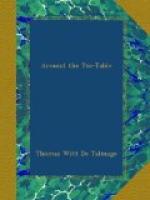For the most part, the owners of large collections have their chief anxiety about the binding and the type. Take down the whole set of Walter Scott’s novels, and find that only one of them has been read through. There are Motley’s histories on that shelf; but get into conversation about the Prince of Orange, and see that Motley has not been read. I never was more hungry than once while walking in a Charleston mill amid whole harvests of rice. One handful of that grain in a pudding would have been worth more to me than a thousand tierces uncooked. Great libraries are of but little value if unread, and amid great profusion of books the temptation is to read but little. If a man take up a book, and feel he will never have a chance to see it again, he says: “I must read it now or never,” and before the day is past has devoured it. The owner of the large library says: “I have it on my shelf, and any time can refer to it.”
What we can have any time we never have. I found a group of men living at the foot of Whiteface Mountain who had never been to the top, while I had come hundreds of miles to ascend it. They could go any time so easily. It is often the case that those who have plain copies of history are better acquainted with the past than those who have most highly adorned editions of Bancroft, Prescott, Josephus and Herodotus. It ought not so to be, you say. I cannot help that; so it is.
Books are sometimes too elegantly bound to be read. The gilt, the tinge, the ivory, the clasps, seem to say: “Hands off!” The thing that most surprised me in Thomas Carlyle’s library was the fewness of the books. They had all seen service. None of them had paraded in holiday dress. They were worn and battered. He had flung them at the ages.
More beautiful than any other adornments are the costly books of a princely library; but let not the man of small library stand looking into the garnished alcoves wishing for these unused volumes. The workman who dines on roast beef and new Irish potatoes will be healthier and stronger than he who begins with “mock-turtle,” and goes up through the lane of a luxuriant table till he comes to almond-nuts. I put the man of one hundred books, mastered, against the man of one thousand books of which he has only a smattering.
On lecturing routes I have sometimes been turned into costly private libraries to spend the day; and I reveled in the indexes, and scrutinized the lids, and set them back in as straight a row as when I found them, yet learned little. But on my way home in the cars I took out of my satchel a book that had cost me only one dollar and a half, and afterward found that it had changed the course of my life and helped decide my eternal destiny.




